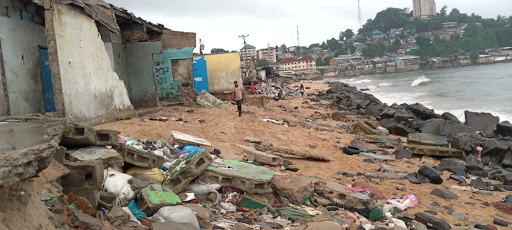Gov’t Launches US$25 Million West Point Coastal Defence Project

President George Weah is expected to launch the ‘Monrovia Metropolitan Coastal Resilience Project’ (MMCRP) today in the slum of West Point.
The MMCRP would address barriers to effective climate change adaptation in the coastal zone of Monrovia, Liberia’s capital, through interventions in three interrelated focus areas including coastal protection, coastal management, and diversified climate-resilient livelihoods. According to a release from the Environmental Protection Agency of Liberia (EPA), the project includes an infrastructure component for the construction of a rock revetment to protect West Point against coastal erosion and storms.
West Point has an estimated population of 75,000. It is a township of Monrovia located on a peninsula that juts out into the Atlantic Ocean between the Mesurado and St. Paul Rivers. The densely populated slum is particularly vulnerable to climate effects including sea-level rise and the increased frequency of high-intensity storms.
This, according to the release, has resulted in coastal erosion and shoreline retreat thus threatening the sustainability of ecosystem services and directly impacting Monrovia’s fishery sector. In 2016, the Government of Liberia through the EPA in partnership with the United Nations Development Program (UNDP) Liberia Country Office submitted a joint proposal to the Green Climate Fund (GCF) for the Monrovia Metropolitan Coastal Resilience Project (MMCRP).
EPA is the executing entity for the project, which is financed by a GCF grant of USD$25 million and co-financed by UNDP and the Government of Liberia. The project seeks to build the long-term climate resilience of coastal communities in Liberia by addressing immediate adaptation priorities and creating an enabling environment for upscaling coastal adaptation initiatives to other parts of Monrovia. This will be done through interventions in three interrelated focus areas including coastal protection; coastal management; and diversified climate-resilient livelihoods.
The project interventions will also focus on activities such as coastal protection, comprehensive, long-term planning for coastal zone management, and the strengthening of local livelihoods — in conjunction with strong awareness-raising and knowledge management considerations and will address both the immediate and long-term impacts of climate change on the coast of Monrovia and facilitate the potential for upscaling these initiatives across Liberia.
